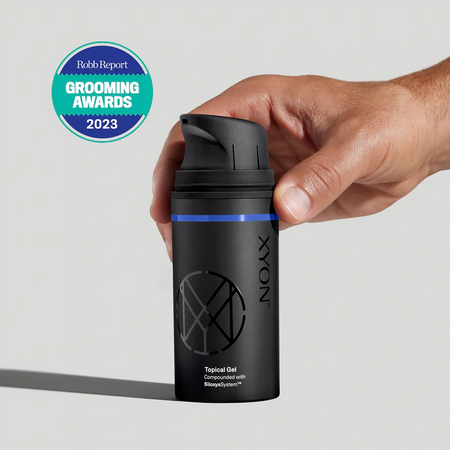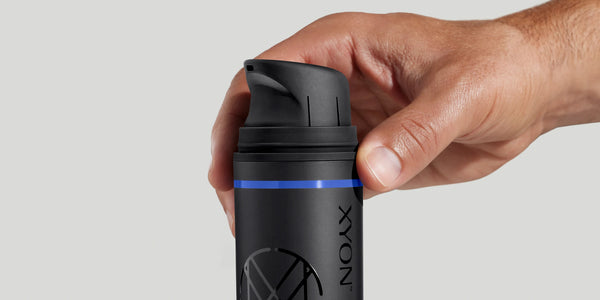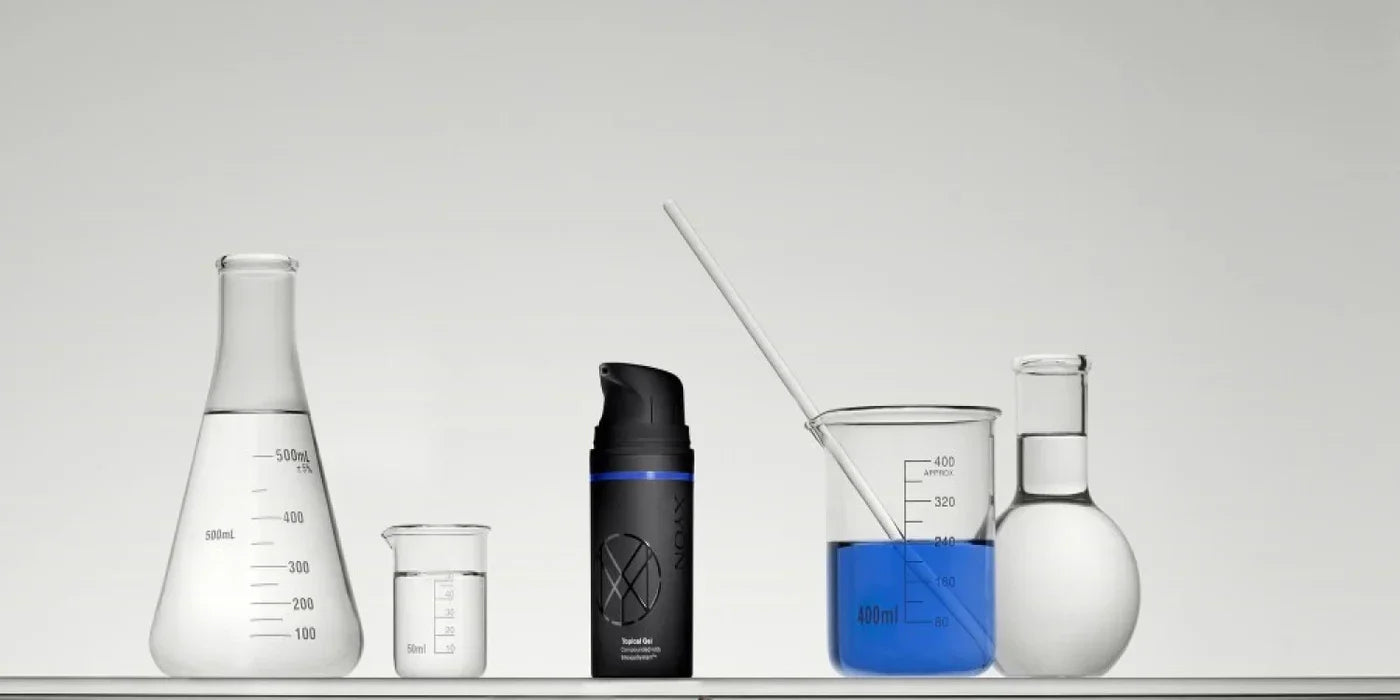Hair loss can be distressing for many, so it's understandably concerning to hear that one of the primary treatments for hair loss, finasteride, may have an impact on mental health. It’s widely prescribed to help treat pattern hair loss and for many, it’s an effective medication without significant downsides. But there have been some reports of finasteride being linked to depression and the mechanisms behind this possible link aren’t well understood.
We’re going to delve into the potential link between finasteride use and depression and talk about ways in which you can minimize your risk of experiencing mental health impacts while taking finasteride.


Minimize The Risk Of Side Effects With Topical Fintasteride
If you're worried about the side effects from taking finasteride, our topical solution is known for its effectiveness with minimal side effects.
Is depression a side effect of taking finasteride?
Finasteride was first approved to treat hair loss in the 1990’s and at the time, depression was not formally recognized as a side effect. However, cases began to emerge of people suffering from depression and related psychological side effects after taking finasteride and the concerns surrounding it grew. Eventually in 2019, revisions were made to the drug monograph by the FDA and Health Canada to add depression to the list of potential side effects associated with finasteride. Let’s take a closer look at some of the findings that prompted these changes.
Concerning findings
Controversially, US regulators decided not to update finasteride drug warnings to include depression during an update in 2011, despite being made aware of several cases of suicidal behavior linked to finasteride use. Following this decision in 2011, the FDA received over 700 reports of suicide and suicidal thoughts amongst finasteride users. It was these reports, coupled with Health Canada’s reviews which ultimately prompted changes to the monograph. Interestingly, the FDA chose to not include suicidal ideation as a warning, listing just depression.
The Health Canada review looked at cases of depression and suicidal ideation between 1995-2015, receiving 12 reports of suicide suspected to be directly linked to oral finasteride use (Health Canada, 2015). Of the 12 cases, 9 were taking prescribed oral finasteride for pattern baldness. This review was the primary reason for the updates that were made to the product monograph in Canada to include depression and suicidal ideation in the warnings. But these weren’t the only instances of depression being linked to finasteride.
More recently, researchers collecting data from the World Health Organization’s global database found there to be disproportional cases of suicidality, depression and anxiety associated with finasteride use (Nguyen et al, 2020). In these cases, all patients were males under 45 years old who were taking finasteride for hair loss. This research concluded that the risk of mental health side effects should be a consideration when prescribing finasteride to younger males experiencing hair loss and they suggested that this group of people may be more vulnerable to adverse psychological side effects.
But what are some of the potential mechanisms behind depression being associated with taking finasteride?
How do 5-alpha-reductase inhibitors affect mental health?
So how exactly do 5-alpha reductase inhibitors like finasteride impact mental health? The exact mechanisms aren’t clear.
Some have suggested that depression while taking finasteride could be attributed to the sexual side effects of this medication. Other men are grappling with the psychological impact of hair loss itself and given that finasteride isn’t an instant cure, it’s reasonable to suggest that worries around the progression of hair loss or a lack of visible results might be contributing to mental health challenges. However, there are also several possible biological or biochemical explanations for why finasteride might cause or exacerbate depression.
Finasteride works by preventing the conversion of testosterone into DHT. But this isn’t the only function of the 5-AR enzyme. The 5-AR enzyme is also known to play a role in reactions occurring in certain parts of the brain (Divicarro et al, 2020). Alongside another enzyme, it converts cholesterol and related steroids into secondary products, known as neuroactive steroids. Neuroactive steroids have the ability to alter how some receptors on brain cells respond to neurotransmitters. This can change the activity of brain cells and is believed to play a role in the development of mood disorders, such as anxiety (Romer & Gass, 2010).
A key neuroactive steroid thought to be implicated in depression is called allopregnanolone (Castelli et al, 2013). Finasteride may disrupt the production of allopregnanolone and lower concentrations of this steroid in the brain. In fact, previous studies have shown a correlation between low levels of allopregnanolone and the development of depression (Rahimi-Ardibili et al, 2006).
The association between low androgen levels and depression
Another potential way in which finasteride could cause depression is through lowering androgen levels. Research has shown that androgens levels may affect how dopamine, a neurotransmitter important in mood regulation, is stored and used by the brain. The role of dopamine in mood regulation is well established, with studies showing the correlation between low dopamine levels and feelings of sluggishness and loss of pleasure (Sanchez et al, 2010). Human studies of the link between androgens and dopamine are limited, but there are examples of animal studies that have found that reduced 5-AR activity and lower androgen levels can lead to depressive behavior (Tobiansky et al, 2018).
Ultimately the relationship between androgens and dopamine levels is not fully understood, and more research is needed in this area. The above theories are plausible, but the fact remains that finasteride is an effective treatment for hair loss. The psychological impacts of hair loss for some men can be damaging and the potential for hair regrowth or preventing further balding may outweigh the risks associated with medication.
When it comes to choosing your treatment, it’s important to understand the options available so that you can make an informed decision and weigh up the potential risks involved with each treatment.
Does applying finasteride via a topical gel decrease the risk of depression as a side effect?
We believe that all everyone should be able to make an informed decision when it comes to their health and at XYON, we have treatment options available which have been specifically designed to address some of the risks associated with hair loss medications. Topical Finasteride with SiloxysSystem Gel™ has been designed to reduce potential side effects by minimizing the amount of finasteride absorbed into the bloodstream. It could be a great option if you are concerned about the potential risks of oral finasteride but does require a consultation with a doctor and prescription to obtain. Fortunately, we make it easy to connect with a hair loss specialist with our online platform.
If you’ve spoken to your doctor and confirmed that finasteride isn’t right for you, there are other options, including minoxidil. Instead of lowering DHT levels, minoxidil treats hair loss by widening the blood vessels in the scalp and improving the supply of oxygen and key nutrients to the hair follicles. This helps to boost hair growth and maintain the growth phase of the hair cycle. Minoxidil is FDA-approved as a topical treatment for pattern balding (in fact, you can get it over the counter as a 2% solution or 5% foam), but it may also be prescribed off-label as an oral tablet, following a consultation with a doctor. At XYON, we’ve formulated a compounded low-dose version of oral minoxidil that includes vitamin D to help address multiple possible causes of hair loss. Just because you can’t or don’t want to take finasteride, doesn’t mean you don’t have options.
The bottom-line on whether finasteride causes depression
Since the emergence of cases associating finasteride use with depression, steps have been taken by regulatory agencies and drug manufacturers to inform users of the risks. These known safety risks should be weighed against the effectiveness of finasteride for hair loss and this will likely factor into the decision to take medication or not. Ultimately, you shouldn’t have to compromise when it comes to your health and fortunately you have options for hair loss treatments. Many of these options are available at XYON and are designed to minimize your risk of side effects, so that you can feel confident in your hair loss journey. Connect with our hair loss specialists to start treatment that’s right for you.
References
Castelli, M.P., Casti, A., Casu, A., Frau, R., Bortolato, M., Spiga, S., Ennas, M.G. (2013). Regional distribution of 5a-reductase type 2 in the adult rat brain: An immunohistochemical analysis. Psychoneuroendocrinology, 38(2), 281-293. https://doi.org/10.1016/j.psyneuen.2012.06.008
Diviccaro, S., Cioffi, L., Falvo, L., Giatti, S., Melcangi, R.C. (2021). Allopregnanolone: An overview on its synthesis and effects. Journal of Neruoendocrinology, 34(2). https://doi.org/10.1111%2Fjne.12996
Nguyen, D.D., Marchese, M., Cone, E.B., Paciotti, M., Basaria, S., Bhojani, N., Trihn, Q.D. (2020). Investigation of suicidality and psychological adverse events in patients treated with finasteride. JAMA Dermatol, 157(1), 35-42. https://doi.org/10.1001/jamadermatol.2020.3385
Rahimi-Ardabili, B., Pourandarjani, R., Habibollahi, P., Mualeki, A. (2006). Finasteride induced depression: a prospective study. BMC Clinical Pharmacology, 7. https://bmcclinpharma.biomedcentral.com/articles/10.1186/1472-6904-6-7#citeas
Romer, B., Gass, P. (2010). Finasteride-induced depression: new insights into possible pathomechanisms. Journal of Cosmetic Dermatology, 10(1), 85. https://doi.org/10.1111/j.1473-2165.2010.00533.x
Sanchez, M.G., Bourque, M., Morissette, M., Paolo, T.D. (2010). Steroids-Dopamine interactions in the pathophysiology and treatment of CNS disorders. CNS Neuroscience & Therapeutics, 16(3), e43-e71. https://doi.org/10.1111/j.1755-5949.2010.00163.x
Tobiansky, D.J., Wallin-Miller, K.G., Floresco, S.B., Wood, R.I., Soma, K.K. (2018). Androgen regulation of the mesocorticolimbic system and executive function. Frontiers in Endocrinology, 9. https://doi.org/10.3389/fendo.2018.00279




